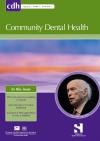Community Dental Health

- Cover Date:
- March 2016
- Print ISSN:
- 0265 539X
- Vol:
- 33
- Issue:
- 1
Are oral health-related self-efficacy, knowledge and fatalism indicators for non-toothbrush ownership in a homeless population?
Are oral health-related self-efficacy, knowledge and fatalism indicators for non-toothbrush ownership in a homeless population?
Aim: To determine if the social cognitive theory (SCT)-constructs of oral health-related efficacy, knowledge and fatalism were indicators of non-toothbrush ownership in a metropolitan-based homeless population in Australia. Methods: Self-report data were collected from a convenience sample of 248 homeless participants located in Adelaide, Australia. Log binomial regression was used to estimate the strength of the association of the SCT constructs efficacy, knowledge and fatalism with the frequency of non-ownership of a toothbrush before and after adjusting for selected characteristics and associated factors.
Key words: self-efficacy, toothbrushing, homeless, knowledge, fatalism, oral health, Australia
doi:10.1922/CDH_3823Jones06
- Article Price
- £15.00
- Institution Article Price
- £
- Page Start
- 48
- Page End
- 53
- Authors
- K. Jones, D. Brennan, E. Parker, M. Steffens, L. Jamieson
Articles from this issue
- Title
- Pg. Start
- Pg. End
- Dental service provision by oral health therapists, dental hygienists and dental therapists in Australia: implications for workforce modelling
- 15
- 22
- A randomized controlled trial of cluster audit and feedback on the quality of dental sealant for rural schoolchildren
- 27
- 32
- Identification of barriers and beliefs influencing engagement by adult and teen Mexican-Americans in oral health behaviors
- 44
- 47
- Are oral health-related self-efficacy, knowledge and fatalism indicators for non-toothbrush ownership in a homeless population?
- 48
- 53
- Sense of coherence modifies the association between untreated dental caries and dental pain in low-social status women
- 54
- 59
